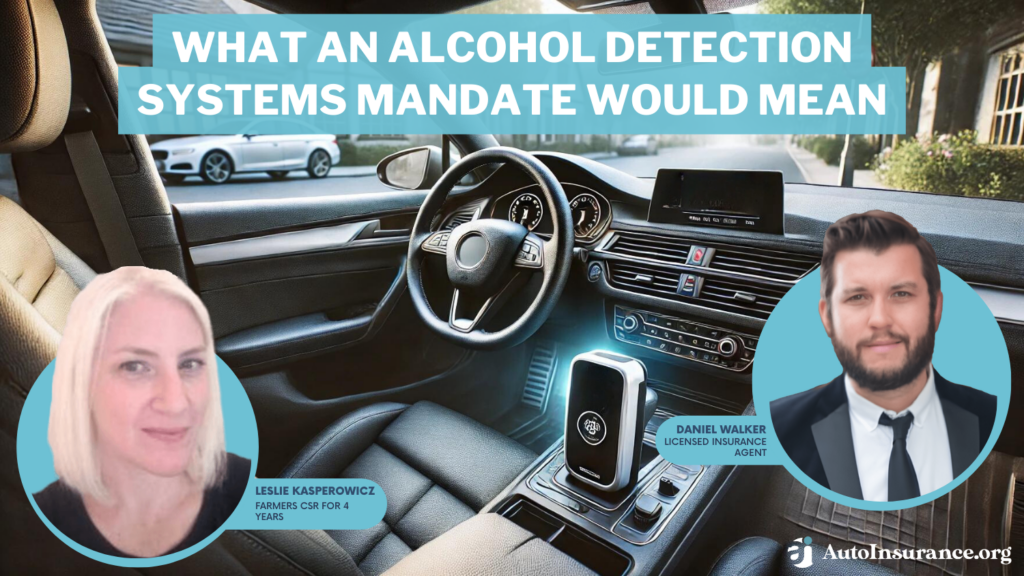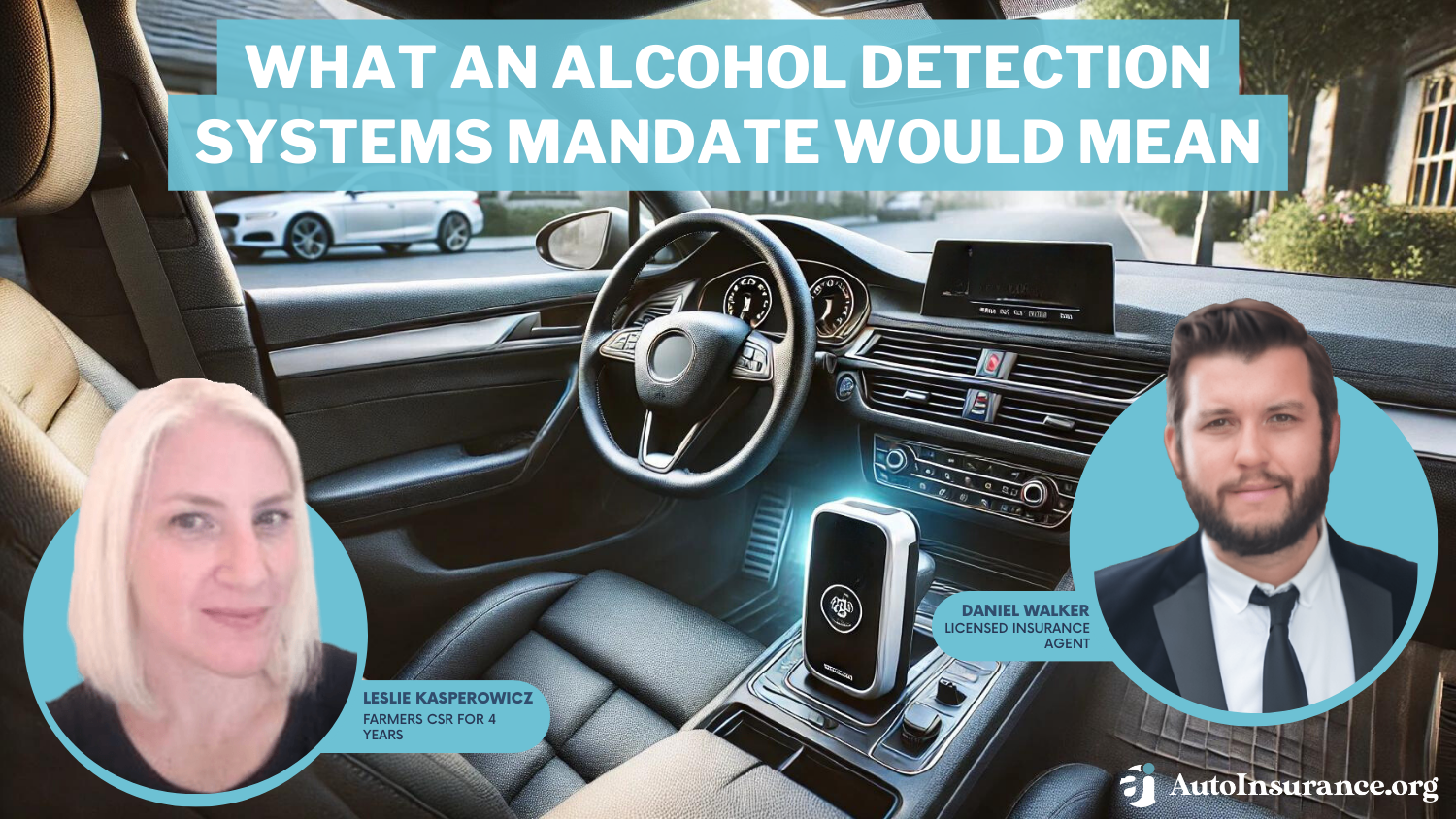What an Alcohol Detection Systems Mandate Would Mean (2026)
The new infrastructure bill, signed by President Joe Biden in November of 2021, allocates billions of dollars to be used in safety measures for vehicles. New vehicles will be required to include built-in alcohol detection systems (ADS) that measure the driver’s blood-alcohol percentage in order to cut down on drunk driving. In the near future, auto insurance companies will begin to incentivize the inclusion of ADS in all vehicles by offering discounts as a way to save on coverage.
Read more Secured with SHA-256 Encryption




Table of Contents
Table of Contents


Farmers CSR for 4 Years
Leslie Kasperowicz holds a BA in Social Sciences from the University of Winnipeg. She spent several years as a Farmers Insurance CSR, gaining a solid understanding of insurance products including home, life, auto, and commercial and working directly with insurance customers to understand their needs. She has since used that knowledge in her more than ten years as a writer, largely in the insuranc...
Leslie Kasperowicz


Licensed Auto Insurance Agent
Daniel Walker graduated with a BS in Administrative Management in 2005 and has run his family’s insurance agency, FCI Agency, for over 15 years (BBB A+). He is licensed as an insurance agent to write property and casualty insurance, including home, life, auto, umbrella, and dwelling fire insurance. He’s also been featured on sites like Reviews.com and Safeco. To ensure our content is accura...
Daniel Walker
Updated December 2024
More than 10,000 people die from drunk driving incidents every year in the United States. That number is expected to decrease thanks to a new infrastructure bill.

The infrastructure bill, signed by President Joe Biden in November of 2021, allocates billions of dollars to fight drunk driving with alcohol detection systems in new vehicles. Another deterrent to drunk driving is the risk of getting a DUI. What is a DUI? It’s a traffic violation given to individuals who are caught driving under the influence of drugs or alcohol.
- The infrastructure bill requires vehicles to use alcohol detection systems that measure a driver’s blood alcohol content (BAC)
- Alcohol detection systems are expected to significantly decrease the number of drunk driving incidents in the U.S.
- The increased implementation of alcohol detection systems will likely impact auto insurance rates
What are alcohol detection systems?
Alcohol detection systems (ADS) are essentially in-car breathalyzer interlock devices that are programmed to work within individual vehicles. Alcohol detection systems measure a person’s blood alcohol level each time they start the car.
If the driver has been drinking alcohol, the car’s ADS will recognize their blood alcohol content (BAC) is too high for them to drive legally.
The car will not start but will re-test the driver until they receive a clean breath reading. Once the driver no longer shows signs of having consumed alcohol, the car will start, and the driver will no longer have to wait.
Auto insurance for impaired drivers can be extremely expensive, which should also deter drinking and driving.
Free Insurance Comparison
Compare Quotes From Top Companies and Save
Secured with SHA-256 Encryption
Will I need an alcohol detection system in my vehicle?
According to the infrastructure bill, only newly-produced cars will be required to include an alcohol detection system, and automakers will have a few years before everything is officially put into place.
The National Highway Traffic Safety Administration (NHTSA) will have to choose which universal system new vehicles will be required to use and will also need to set up the necessary safety standards.
Once the NHTSA has chosen the alcohol detection system that will be used, automakers will be granted three years to install these devices into new vehicles. Realistically, this means that new cars with built-in ADS equipment may not be available until 2026.
You may wonder, does a physical control violation increase auto insurance rates or do you have to be driving to get a DUI? Sitting in a parking lot in the driver’s seat with the car running counts as physical control, and you can typically get a DUI conviction for that.
Will I need an ADS if I don’t have a new vehicle?
The infrastructure bill will not require cars produced before the NHTSA’s decision to have built-in alcohol detection systems.
However, some car insurance companies are already offering auto insurance discounts for people who have alcohol detection systems installed in their cars.
You may find that including an ADS in your car lowers your overall car insurance rates. But you’ll have to speak to your car insurance company to find out for sure.
Will alcohol detection systems impact auto insurance rates?
In the near future, more and more car insurance companies will incentivize including built-in alcohol detection systems in order to cut down on drunk driving.
This may allow people to lower their car insurance rates by installing an ADS in their cars since drunk driving rates by stas are much higher than the average car insurance payment.
Car insurance companies will also likely keep track of ADS readings. While this information may not be reported to any specific organizations, it does have the potential to impact car insurance rates as well.
If you are driving a car with an alcohol detection system, and you register as having a blood alcohol percentage that’s too high, you may face elevated car insurance rates as a result.
You can opt to have an ADS added to your vehicle, but you should check with your insurance company beforehand to see if you can get a safety feature discount on your insurance rates.
Be sure to use our free quote tool below to compare car insurance rates today and see how much you could save.
- The infrastructure bill requires vehicles to use alcohol detection systems that measure a driver’s blood alcohol content (BAC)
- Alcohol detection systems are expected to significantly decrease the number of drunk driving incidents in the U.S.
- The increased implementation of alcohol detection systems will likely impact auto insurance rates
More than 10,000 people die from drunk driving incidents every year in the United States. That number is expected to decrease thanks to a new infrastructure bill.
The infrastructure bill, signed by President Joe Biden in November of 2021, allocates billions of dollars to fight drunk driving with alcohol detection systems in new vehicles.
Free Insurance Comparison
Compare Quotes From Top Companies and Save
Secured with SHA-256 Encryption
What are alcohol detection systems?
Alcohol detection systems (ADS) are essentially in-car breathalyzer interlock devices that are programmed to work within individual vehicles. Alcohol detection systems measure a person’s blood alcohol level each time they start the car.
If the driver has been drinking alcohol, the car’s ADS will recognize their blood alcohol content (BAC) is too high for them to drive legally.
The car will not start but will re-test the driver until they receive a clean breath reading. Once the driver no longer shows signs of having consumed alcohol, the car will start, and the driver will no longer have to wait.
Will I need an alcohol detection system in my vehicle?
According to the infrastructure bill, only newly-produced cars will be required to include an alcohol detection system, and automakers will have a few years before everything is officially put into place.
The National Highway Traffic Safety Administration (NHTSA) will have to choose which universal system new vehicles will be required to use and will also need to set up the necessary safety standards.
Once the NHTSA has chosen the alcohol detection system that will be used, automakers will be granted three years to install these devices into new vehicles. Realistically, this means that new cars with built-in ADS equipment may not be available until 2026.
Will I need an ADS if I don’t have a new vehicle?
The infrastructure bill will not require cars produced before the NHTSA’s decision to have built-in alcohol detection systems.
However, some car insurance companies are already offering auto insurance discounts for people who have alcohol detection systems installed in their cars.
You may find that including an ADS in your car lowers your overall car insurance rates. But you’ll have to speak to your car insurance company to find out for sure.
Free Insurance Comparison
Compare Quotes From Top Companies and Save
Secured with SHA-256 Encryption
Will alcohol detection systems impact auto insurance rates?
In the near future, more and more car insurance companies will incentivize including built-in alcohol detection systems in order to cut down on drunk driving.
This may allow people to lower their car insurance rates by installing an ADS in their cars since drunk driving rates are much higher than the average car insurance payment.
Car insurance companies will also likely keep track of ADS readings. While this information may not be reported to any specific organizations, it does have the potential to impact car insurance rates as well.
If you are driving a car with an alcohol detection system, and you register as having a blood alcohol percentage that’s too high, you may face elevated car insurance rates as a result.
You can opt to have an ADS added to your vehicle, but you should check with your insurance company beforehand to see if you can get a safety feature discount on your insurance rates.
Be sure to use our free quote tool below to compare car insurance rates today and see how much you could save.

Frequently Asked Questions
What is an alcohol detection system mandate?
An alcohol detection system mandate refers to a policy or regulation that requires the installation of devices in vehicles to detect and prevent drivers from operating a vehicle while under the influence of alcohol. These devices, commonly known as ignition interlock devices (IIDs), require the driver to provide a breath sample before starting the vehicle. If the sample shows alcohol above a specified limit, the vehicle will not start.
How would an alcohol detection systems mandate impact road safety?
Implementing an alcohol detection systems mandate can significantly enhance road safety. By preventing drivers from operating a vehicle while intoxicated, it can potentially reduce the number of alcohol-related accidents, injuries, and fatalities. Research has shown that IIDs are effective in reducing drunk driving incidents, as they act as a deterrent and ensure that individuals with alcohol-related offenses cannot operate a vehicle while impaired.
Are there any potential drawbacks to an alcohol detection systems mandate?
While an alcohol detection systems mandate has numerous benefits, there are some potential drawbacks to consider. These include the costs associated with installing and maintaining the devices, potential technical issues or malfunctions, and the inconvenience it may cause to responsible drivers who do not have a history of alcohol-related offenses. Additionally, there could be concerns regarding privacy, as personal breath samples are required for the system to function.
Would an alcohol detection systems mandate be mandatory for all vehicles?
The scope of an alcohol detection systems mandate can vary depending on the specific policy or regulation. Some mandates may apply to specific categories of vehicles, such as commercial vehicles or those owned by individuals with a history of alcohol-related offenses. In other cases, the mandate may be broader and encompass all vehicles. The exact details and requirements would be determined by the governing body implementing the mandate.
Are there any other countries or regions that have implemented an alcohol detection systems mandate?
Yes, several countries and regions have implemented alcohol detection systems mandates to enhance road safety. For example, some U.S. states have laws requiring the installation of ignition interlock devices for individuals convicted of driving under the influence (DUI) offenses. Additionally, certain countries, such as Sweden and France, have implemented alcohol interlock programs as part of their efforts to combat drunk driving.
Get a FREE Quote in Minutes
Insurance rates change constantly — we help you stay ahead by making it easy to compare top options and save.






